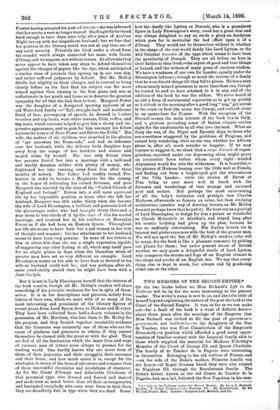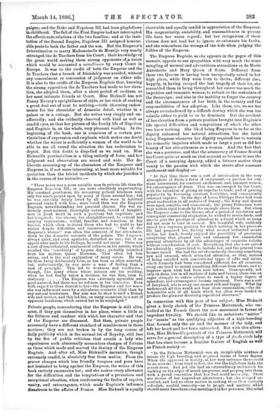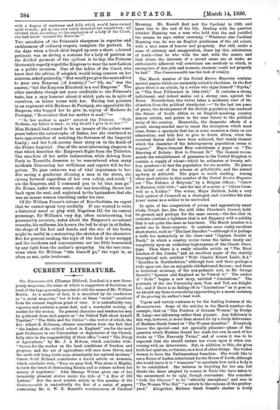TWO MEMOIRS OF THE SECOND EMPIRE.*
OF the two books before us, Miss Bicknell's Life in. the Tuileries will be by far the more interesting to the general reader. The writer's name is new to us, and she tells little of herself beyond explaining the nature of the post she held at the Court of the Second Empire. It was, as far as we can make out—for a fault of the book is a want of definite dates— about three years after the marriage of the Emperor that Miss Bicknell was invited to fill the poet of governess- gourernaate, not instil utrice —to the daughters of the Due de Teacher, who was First Chamberlain of the Empress's Household,—a position which afforded a good many oppor- tunities of familiar contact with the Imperial family akin to those which supplied the material for Madame D'Arblay's Memoirs of the Court of George III. and Queen Charlotte. The family of de Teacher de la Pagerie were interesting in themselves. Belonging to the old noblesse of France, and —on the side of the Duke's mother, Princess Amelie von der Leyen—of Royal German blood, they were also related to Napoleon III. through the Beauharnais family. The Duke's father, known as the old Comte de Tascher de in Pagerie, had, as a lad, followed the first Napoleon in his cam- • (1) Life in the Tuileries under the Second Bmpire. By Anra L. Bioknell. London: T. F6har truwin.—(2.) Napoleon III.: My Itecellechtons. By Sir Witiam Fraser, Bart, London Satupion Low, Marston. and Co.
paigns; and the Duke and Napoleon III. had been playfellows in childhood. The fall of the First Empire had not interrupted the affectionate relations of the two families; and at the insti- tution of the Second Empire, Napoleon III. assigned honour- able posts to both the father and the son. But the Emperor's determination to marry Mademoiselle de Montijo very nearly
estranged the de Taschers from his Court ; their knowledge of the great world making them strong opponents of union which would be accounted a misalliance by every Court in Europe. It was to the credit of both the Emperor and the de Teachers that a breach of friendship was avoided, without any concealment or concession of judgment on either side. It is also to the credit of the Empress Eugenie that, knowing
the strong opposition the de Teachers had made to her eleva- tion, she adopted them, after a short period of coolness, as her most intimate friends at Court. Miss Bicknell has not Fanny Burney's sprightliness of style, or her trick of making a great deal out of next to nothing,—both charming endow- ments for the chronicler of domestic detail, whether in a palace or in a cottage. But she writes very simply and un-
affectedly; and she evidently observed with kind as well as candid eyes, so that her picture of the family life of Napoleon
and Eugenie is, on the whole, very pleasant reading. In the beginning of the book, one is conscious of a certain pro-
vincialism of expression and emphasis. which makes one doubt whether the writer is sufficiently a woman of the world to be able to see all round the situation she has undertaken to depict. But this doubt is dispelled as we read on. Miss Bicknell's provincialism is a thing entirely of form, and her judgment and observation are sound and wide. Her de- liberate summing-up of the characters of the Emperor and Empress is, if not more interesting, at least more suitable for quotation than the trivial incidents by which she justifies it in the course of her narrative :— "There never was a more amiable man in private life than the Emperor Napoleon III., or one more absolutely unpretending His constant gentleness, his unvarying patient kindness were only too much preyed upon by many of those around him ; but he was certainly deeply loved by all who were in habitual personal contact with him ; more loved than was the Empress Eugenie, notwithstanding her personal charms. She was ex- tremely good-natured, thoroughly natural, devoid of haughti- ness (a great merit in such a position) but impulsive and hot-tempered ; too sincere, too straightforward, to conceal her varying impressions ; withal, fanciful, and tenacious in her fancies, which often in Rated those who had to yield to her wishes despite difficulties and inconvenience. One of the Empress's whims I' was often the comment of her attendants, down to the domestic servants of the palace. The Emperor, always quiet, and even apathetic, disturbed no one; but if an appeal were made to his feelings, he could not resist There was a sort of tenderhearted, sentimental softness in his nature, which recalled the 'sensibility' of bygone days; probably inherited from his mother, Queen Hortense. This often led him astray, and is the real explanation of many errors. He was far from being deliberately false, as has been so often asserted ; but, unfortunately, he was more a man of feeling than a man of principle. This led to weakness and vacillation ; though, like many others whose natures are too yielding, when he had finally taken a decision, he was firm, even to obstinacy The Empress was extremely agreeable and good-natured, but there was no softness in her character. Even with regard to those dearest to her—the Emperor rnd her son— she was influenced more by a chivalrous, romantic ideal than by any natural tenderness. Her aim was to show herself a Roman wife and mother, and this led her, on many occasions, to a sort of apparent harshness, which caused her to be misjudged."
Private people, remembering that the Empress is still alive, must, if they put themselves in her place, wince a little at the fullness and candour with which her character and that of the Emperor are discussed. But then, private people necessarily have a different standard of sensitiveness in these matters; they are not broken in by the long course of daily publicity which is the normal lot of Royalty, still less by the fire of public criticism that assails a lady who experiences such abnormally momentous changes of fortune as those which made and marred the destiny of the Empress Eugenie. And after all, Miss Bicknell's narrative, though
extremely candid, is absolutely free from malice. From the graver charges which less friendly tongues and pens have not hesitated to bring against the Empress, the writer of this book entirely exonerates her ; and she makes every allowance for the difficulties and the temptations of a precarious and
exceptional situation, when condemning the faults of caprice, vanity, and extravagance, which made Eugenie's influence disastrous to the affairs of France. Miss Bicknell is equally
charitable and equally candid in appreciation of the Emperor. His magnanimity, amiability, and reasonableness in private life have her warm regard ; but her recognition of these virtues does not lead her to ignore or extenuate his faults, and she remembers the wrongs of the wife when judging the foibles of the Empress.
The Empress Eugenie, as she appears in the pages of this memoir, appeals to our sympathies with very much the same mingling of natural and adventitious attractions as do Marie Antoinette and Mary Queen of Scots. Different from these two Queens in having been unexpectedly raised to her high place, while they were born to theirs; different also, happily, in having escaped the last tragedy of their lot, she resembled them in being throughout her career too much the impulsive and romantic woman, to submit to the restraints of the Sovereign; and also in the inability to forget the country and the circumstances of her birth, in the country and the responsibilities of her adoption. Like them, too, we see her always overshadowed by a difficult destiny which she was too volatile either to yield to or to dominate. But the accident of her elevation from a private position brought into Eugenie's life special difficulties and temptations of which the other two knew nothing. She liked being Empress in so far as the dignity enhanced her natural attractions, but she hated being Empress whenever her dignity required her to restrain the romantic impulses which made as large a part as did her beauty of her attractiveness as a woman. And the fact that, she was a parvenue, and that the aristocracy of France flouted her Court quite as much on that account as because it was the Court of a usurping dynasty, added a bitterer motive than vanity to the passion with which she strove after constant excitement and display :— " At that time there was a sort of intoxication in the very atmosphere of Paris, a fever of enjoyment,—a passion for con- stant amusement, for constant excitement, and, amongst women, for extravagance of dress. This was encouraged by the Court, with the intention of giving an impetus to trade, and of gaining popularity by favouring constant festivities, and consequently constant expense. In the days of Louis Philippe there had been great moderation in all matters of luxury ; the King and Queen were aged, sensible, and economical; the young Princesses were kept within rigid bounds by the example above them. But when the Emperor came to the throne, after a period of revolution and consequent commercial stagnation, he wished to revive trade, and also to give the prestige of f plendour to a Court which so many did not seem to take in earnest. His beautiful wife, suddenly raised to a supreme position for which nothing in her previous life had prepared her, finding what seemed unlimited means within her reach, keenly enjoyed the possibility of procuring everything that pleased her, and enhanced her remarkable personal attractions by all the advantages of exquisite toilette without consideration of cost. Everything that she wore suited her admirably ; others tried to imitate her, and the general tone became raised She had the art of constantly choosing something new and unusual, which attracted attention, so that, instead of being satisfied with conventional types of silks and satins, which formerly had been considered sufficient for all occasions, every one tried to invent something different from others, and to improve upon what had been seen before. Consequently, not only in dress, but in all matters of taste and luxury, there was an eager struggle to outvie others, to reach a higher degree of splendour, and extravagance became universal. Paris was a sort of fairyland, where every one seemed rich and happy. What lay underneath all this would not bear close examination,—the dis- honourable acts of all kinds which too often were needed to produce the glamour deceiving superficial observers."
In connection with this part of her subject, Miss Bicknel) gives a lively sketch of the Prine,ees Metternich, who em- bodied at the French Court the new movement in favour of impudent frivolity. We should like to substitute " native " for "innate" as the qualifying adjective of a high-breeding that formed only the air and the manner of the lady, and left her heart and her taste untouched. But with this altera- tion, Miss Bicknell's portrait of the Princess Metternich will serve for a general description of a type of fin-de siecle lady that has since become a familiar feature of English as wall as French society :- "In the Princess Metternich was an inexplicable mixture of innate (?) high breeding, and acquired tastes of lower degree. When she appeared in society, at her very entrance there could be no mistake ; from head to foot, she was the high-born lady, the grande dame. And yet she had an extraordinary inclination fox walking on the edges of moral quagmires, and peeping into them, with a proud conviction that her foot could never slip. There are stories of her imprudent adventures ; but she escaped un- scathed, and had no other motive in seeking them than curiosity —foolish, morbid curiosity—as to peaple and matters which should never have been even mentioned in her presence. She acted
with a degree of weakness and folly which would have ruined most women; yet no one ever really attacked her reputation ; all allowed that, according to the expression of a lady of the Court, she had never 'crossed the Rubicon:" Two anecdotes of the Princess's sharpness in repartee and recklessness of ordinary respect, complete the portrait. In the days when a black skirt looped up over a short coloured
petticoat was as daring a costume for a lady of position as the divided garment of the cycleuse is to-day, the Princess
Metternich eagerly urged the Empress to wear the new fashion on a public occasion. One of the ladies of the Court, who knew that the advice, if adopted, would bring censure on her
mistress, asked pointedly, "But would you give the same advice to your own Empress [of Austria] P "—" Oh, no," was the answer, "but the Empress Elizabeth is a real Empress." The other anecdote, though not more creditable to the Princess's
taste, has a racy humour about it which puts us, in spite of ourselves, on better terms with her. Having lost patience in an argument with Madame de Persigny, she appealed to the Empress, who begged her to give in, saying of Madame de Persigny, "Remember that her mother is mad !"—
" So her mother is mad ? ' retorted the Princess. Well,
Madame, my father is mad ; so why should I give in to her ? ' " Miss Bicknell had ceased to be an inmate of the palace some years before the catastrophe of Sedan, but she continued to have opportunities of watching the fortunes of the Imperial family ; and her b )ok carries their story on to the death of the Prince Imperial. One of the most interesting chapters is that which describes the Empress's flight from the Tuileries. The anecdote of her noble indiscretion, while driving from Paris to Trouville, deserves to be remembered when many incidents illustrating her wilfulness and caprice will be for-
gotten. To pass unknown was of vital importance to her. But seeing a gendarme ill-using a man in the street, she sprang forward regardless of her own safety, and cried, I
am the Empress, and I command you to let that man go.' Dr. Evans, under whose escort she was travelling, thrust her back upon the seat, and explained to the bystanders that she was an insane woman travelling under his care.
Of Sir William Fraser's volume of Recollections, we regret that we cannot speak very cordially. If one wanted to write a historical novel or play with Napoleon III. for its central personage, Sir William's very dry, often uninteresting, but presumably accurate, notes about the Emperor's occasional remarks, his uniforms, his horses, the bed he slept in at Sedan, the shape of his feet and hands, and the size of his boots, might be useful in constructing the skeleton of the character. Bat for general reading, the style of the book is too scrappy and the incidents and conversations are too little humanised by any light from the author's sympathy. On the rare occa- sions when Sir William "lets himself go," the topic is, as often as not, quite irrelevant.








































 Previous page
Previous page